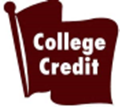CTE - Video Production
Video Production is a competency-based Career & Technical Education program offered at Milford High School & Applied Technology Center. To earn “Program Completer” status in this program, students must pass Video Production I & II with a grade of “C” or better. Students are eligible to earn Industry Recognized Credentials or Certification by passing Third-Party exams administered to program completers.

| Introductory Course for this Pathway |
|
Introduction to Multimedia 1880
1 Credit Grade 9
Are you a fan of digital drawing? Ever wonder how you can make amazing social media videos right from your cell phone? Want to learn more about Cell Phone Photography and Videography? An Introduction to Multimedia is the very first stepping stone towards either the Graphic Arts or Video Production CTE programs. This entry level class will introduce you to the concepts of working with digital media, introduce concepts of both Photography and Videography via cell phones or cameras in everyday life (Chromebook), and career exploration within the fields of Graphic Design and Video Production.
Prerequisite: None
|
 Video Production I 1846
Video Production I 1846
2 Credits Full-Year Grades 10-12
Students in this class will develop basic skills and competencies relating to narrative filmmaking, live broadcast production, and corporate, educational, and social-media based production. The curriculum is taught through a largely, project-centered methodology, which combines “hands-on”, practical, and theory based instruction - with the emphasis on developing usable and transferable workplace skills and competencies. Specific areas of study include such things as camera operation, visual composition, audio recording, 3-point lighting, non-linear (computer-based) editing, camera movement, writing, copyright law, and more. Students will use a variety of industry-standard, professional style production equipment and software – providing an authentic experience. They will advance their general computer technology skills using one of the 20 high-end, PC’s located within the multi-room studio. Students should also anticipate using (and learning more about) their smartphones in class, which they will employ to take photos and videos as part of their project work. Equally important in the students' training will be learning more about – and building - career-based, “Professional Skills”.
Prerequisite: None (class is not available to freshmen, who are encouraged to take “Intro to Multimedia”)
College Credits: For those who register for the “Early College at High School” program, and complete both Video Production I with a “C” or better, three college credits will be obtained. Great Bay Community College in Portsmouth, NH has made this available to 10th-12th graders.
Video Production II 1847
2 Credits Full-Year Grades 11-12
Students wishing to explore further into the world of Video Production will continue by diving deeper into more advanced levels of those skills studied in Video Production I - with greater emphasis placed on areas of the workflow and production that most closely adhere to industry workplace requirements. Pre-production work will expand to include things such as scripts and storyboards, and additional production elements such as color-grading, audio mixing, Foley sound effects, special visual effects, and remote/field broadcasting. Other professional production and post-production software programs will be introduced, such as Adobe Premiere Pro, Lightroom Classic, and Audition. Also introduced will be more advanced, live-broadcast production elements. Students will be expected to perform well individually and in teams, and meet strict deadlines for their project work. Developing strong and consistent “Professional Skills'' will be a priority, along with an expanded exploration of industry-based jobs and other employment topics.
Prerequisite: Completion of Video Production I with a grade of “C” or better.
Articulation Agreement - successful completion of Video I & II results in college credits at Keene State College (may only be used at KSC).
|
CTE Work Based Learning 1/2 Credit* 1 Credit* Grades: 11 - 12 Work-Based Learning (WBL) provides advanced CTE students the opportunity to learn about the world of work. Students will develop and enhance essential 21st century workforce skills to become industry-ready. CTE WBL empowers students with real work experience, under the supervision of an approved work-site mentor, and the guidance of their CTE instructor. Advanced CTE classwork is meant to supplement and complement this WBL experience, therefore it is expected that students will attend CTE class when scheduled and complete all work as assigned. Credit will be awarded based on satisfactory evaluations from their site supervisor, participation in seminars, completion of related assignments & the number of verified WBL hours. The student is expected to meet with the Career Development Specialist regularly during TASC to review work performance goals, timesheets, journal entries, and capstone project. Students will be required to present their approved capstone project to a panel of mentors, Career Development Specialist, and partnering CTE instructor for final evaluation. |
 Awards College Credit
Awards College Credit